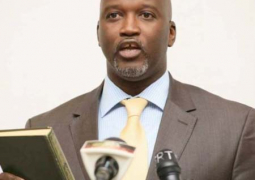
Justice
Naceesay Sallah-Wadda has said the Women’s Act 2010 and its amendment,
prohibiting female circumcision, has effectively taken full advantage of the
salient provisions of the Maputo Protocol in the government’s resolve to
protect the rights of women and girls in all its necessary forms.
Justice
Sallah-Wadda was speaking at the opening of a two-day workshop organised by the
Institute for Human Rights and Development in Africa (IHRDA), in collaboration
with the Female Lawyers Association of The Gambia (FLAG).
The
theme of the workshop was: “Advancing Women’s Rights in The Gambia through the
use of international legal instruments”.
According
to her, various other recent enactments in The Gambia such as the Women’s
(Amendment Act 2015), prohibiting female circumcision as well as the Sexual
Offences Act, 2013 ,are milestone legislations aimed at protecting the rights
that have been guaranteed by the Protocol.
Justice
Sallah Wadda noted that the workshop’s main objective would not only raise the
awareness of women to the existing national and international legal
instruments, that exist in The Gambia and in Africa for safeguarding and the
protection of the rights of women, but also would serve as a forum in raising
the awareness of women as to how to make use of these instruments, as and when
the need arises.
The
African Charter on Human and Peoples’ Rights, which has now been ratified by
all the 54 member states of the African Union, is the parent treaty of the
Protocol on the rights of women in Africa.
She
added that the African Charter itself provides for the protection of various
human rights; that is, from the protection of the general fundamental rights to
those of specific groups, such as the rights of women.
She
pointed out that Article 2 of the African Charter enshrines the principles of
non-discrimination, including on the grounds of sex, and Article 18(3) calls on
all state parties to eliminate discrimination against women, and to ensure the
protection of the rights of women as stipulated in international declarations
and conventions.
Justice
Wadda noted that the challenges in The Gambia, in her view, remained in the
areas of lack of awareness of the various legislations protecting the rights of
women, as well as the unwillingness in many cases of having womenfolk report
instances of violence and abuse being meted out to them.
She
said the workshop was not only timely, but a right step in the right direction
and, therefore, urged the participants to make full use of it.
In
her opening remarks, Janet Sallah-Njie, the board chair of IHRDA, said the
training workshop on the application of the Maputo Protocol is pertinent for
the advancement of the rights and welfare of women in The Gambia.
She
said experience has shown that women’s rights advocates and litigators always
have a preference for domestic legislation, and are mostly unfamiliar with
international instruments protecting women’s human rights.
She
expressed optimism that at the end of the two-day workshop, the participants
would be trained to build the capacities of key actors, so they would be able
to improve enforcement of these international instruments as a means to uphold
women’s rights in The Gambia.
The
Executive Director of IHRDA, Gaye Sowe, in his welcome remarks, said the
participants would be trained on opportunities presented by the legal
instruments for the promotion and protection of women’s rights, particularly
monitoring and reporting on state compliance, and litigating women’s rights,
especially violence against women.
He
revealed that the implementation of the Maputo Protocol in various African
countries has led to the identification of two cases against Mali on women’s
rights, pending before the African court, and two cases against Nigeria pending
before the ECOWAS court.
The
IHRDA director said the workshop would help the participants in using not just
the domestic laws, but the Maputo Protocol in advancing the rights of women in
the country.
Read Other Articles In Article (Archive)



